| (32 intermediate revisions by the same user not shown) | |||
| Line 1: | Line 1: | ||
| − | [[Image:Bass Lk Osprey Viewpoint BF.jpg|thumb| | + | [[Image:Bass Lk Osprey Viewpoint BF.jpg|thumb|650px|right|Photo by {{user|HelenB|HelenB}}<br/>View of southern end of Bassenthwaite Lake from the Upper Viewpoint, May 2009.<br>Click on image to see a larger version]] |
'''[[England]], [[Cumbria]]''' | '''[[England]], [[Cumbria]]''' | ||
| Line 6: | Line 6: | ||
[[Image:Bass Lake from Whinlatter.jpg|thumb|350px|right|Photo by {{user|HelenB|HelenB}}<br/>View of Bassenthwaite Lake looking from the lay-by on the B5292 up to Whinlatter Pass, April 2012. The Ospreys built a new nest in 2011, in the flat marshy area on the south side of the lake ~ the area on the middle right of the photo]] | [[Image:Bass Lake from Whinlatter.jpg|thumb|350px|right|Photo by {{user|HelenB|HelenB}}<br/>View of Bassenthwaite Lake looking from the lay-by on the B5292 up to Whinlatter Pass, April 2012. The Ospreys built a new nest in 2011, in the flat marshy area on the south side of the lake ~ the area on the middle right of the photo]] | ||
| − | === | + | ===2018 Ospreywatch News=== |
| − | *The | + | *The 2018 Ospreywatch season opens on '''Good Friday, 30th March.''' Bassenthwaite's No. 14's tracker is still sending back information and shows that he is well on his way north across the Sahara Desert having left the island of Bioko, south of Nigeria a few days ago. Hopefully, KL and her mate Unring, will have a safe journey back from West Africa. [http://www.ospreywatch.co.uk/wordpress/?page_id=60 Check the LDOP website for updates] and [http://www.facebook.com/ospreywatch their Facebook page] |
| − | + | *'''31st March:''' A male Osprey, possibly Unring has been sighted on the nest, busy adding new nesting materials to it. | |
| − | *''' | + | *'''4th April:''' A female Osprey has arrived and they have been observed mating. Visibility is very poor due to the weather, so the Project Team have not been able to determine if the female is KL. |
| − | + | *'''5th April:''' A 2nd unringed female has appeared at the nest and a fight between the 2 females broke out! Still no sign of KL, who was Unring's partner for 5 years. More details on the LDOP Facebook page, link above. | |
| − | *''' | + | *'''8th April:''' There is now only one female, first seen on 3rd April. |
| − | + | *'''9th April:''' There was another Osprey visitor to the nest and this one had a blue ring on the left leg, indicating that it was a Scottish bird. The Osprey team were unable to read the letters/numbers on the ring while this bird explored the nest, then flew off heading north. Latest news of No 14 - he has reached Le Toquet, in northern France, ready to cross The Channel. | |
| − | + | *'''15th April:''' No 14 has crossed the English Channel near its narrowest point, crossed Kent, the Thames and continued northwest into Leicestershire. When he reached Leicester, he turned and headed southwest to the Cotswolds! At Bassenthwaite there is still no sign of KL and the other affair between Unring and the new female is still more off than on! | |
| − | *''' | + | *'''19th April:''' Still no sign of KL arriving, but from Unring’s behavior he is still on the lookout for her. He’s been tidying up the nest and spending time on a high branch looking for her to arrive. The OspreyWatch team have said that about 25% of Ospreys returning to UK nests have not turned up this year. The average is 8-10%. The weather has not been very cooperative for northbound migrants! In their first year at Bassenthwaite, they both arrived on 24th April. There has been no mention of the unringed female that was at the nest about 10 days ago, so she may have continued on with her migration. |
| − | |||
| − | |||
| − | |||
| − | |||
| − | *''' | ||
| − | *''' | ||
| − | |||
| − | *''' | ||
| − | |||
| − | *''' | ||
| − | |||
| − | |||
| − | |||
==Birds== | ==Birds== | ||
===Notable Species=== | ===Notable Species=== | ||
| − | [[Osprey]], [[Red Kite]] (28 April, 2010), [[Barnacle Goose]] (These are most probably birds from a resident flock on nearby Derwentwater), [[Eurasian Oystercatcher]], [[Great Spotted Woodpecker]], [[Tawny Owl]], [[Common Dipper]], [[Common Redstart]], [[European Pied Flycatcher]], [[Eurasian Treecreeper]]. | + | [[Osprey]], [[Eurasian Marsh-Harrier]] (a pair nested successfully in the reed bed below the viewpoints in 2017), [[Red Kite]] (28 April, 2010), [[Barnacle Goose]] (These are most probably birds from a resident flock on nearby Derwentwater), [[Eurasian Oystercatcher]], [[Great Spotted Woodpecker]], [[Tawny Owl]], [[Common Dipper]], [[Common Redstart]], [[European Pied Flycatcher]], [[Eurasian Treecreeper]]. |
| − | [[Image:Bass from lower viewpoint.jpg|thumb|350px|right|Photo by {{user|HelenB|HelenB}}<br/>Southern end of Bassenthwaite Lake from the Lower Viewpoint, May 09. In 2011, the Ospreys built a new nest in a marshy area there]] | + | [[Image:Bass from lower viewpoint.jpg|thumb|350px|right|Photo by {{user|HelenB|HelenB}}<br/>Southern end of Bassenthwaite Lake from the Lower Viewpoint, May 09. In 2011, the Ospreys built a new nest in a marshy area there]] |
===Rarities=== | ===Rarities=== | ||
| Line 39: | Line 26: | ||
===Check-list=== | ===Check-list=== | ||
| − | {{BirdsSee|[[Great Crested Grebe]], [[Great Cormorant]], [[Grey Heron]], [[Mute Swan]], [[Greylag Goose]], [[Barnacle Goose]], [[Eurasian Wigeon]], [[Gadwall]], [[Eurasian Teal]], [[Mallard]], [[Northern Pintail]], [[Northern Shoveler]], [[Common Pochard]], [[Tufted Duck]], [[Common Goldeneye]], [[Red-breasted Merganser]], [[Goosander]], [[Osprey]], [[Eurasian Sparrowhawk]], [[Common Buzzard]], [[Common Kestrel]], [[Common Pheasant]], [[Water Rail]], [[Common Moorhen]], [[Common Coot]], [[Eurasian Oystercatcher]], [[Northern Lapwing]], [[Common Snipe]], [[Eurasian Curlew]], [[Common Redshank]], [[Common Sandpiper]], [[Black-headed Gull]], [[Common Gull]], [[Herring Gull]], [[Lesser Black-backed Gull]], [[Common Woodpigeon]], [[Common Cuckoo]], [[Tawny Owl]], [[Common Swift]], [[Great Spotted Woodpecker]], [[Sand Martin]], [[Barn Swallow]], [[Northern House Martin]], [[Meadow Pipit]], [[Pied Wagtail]], [[Eurasian Wren]], [[Dunnock]], [[European Robin]], [[Common Redstart]], [[Eurasian Blackbird]], [[Redwing]], [[Song Thrush]], [[Mistle Thrush]], [[Eurasian Reed Warbler]], [[Common Whitethroat]], [[Blackcap]], [[Wood Warbler]], [[Common Chiffchaff]], [[Willow Warbler]], [[Goldcrest]], [[European Pied Flycatcher]], [[Spotted Flycatcher]], [[Blue Tit]], [[Great Tit]], [[Coal Tit]], [[Long-tailed Tit]], [[Eurasian Nuthatch]], [[Eurasian Treecreeper]], [[Common Starling]], [[Eurasian Jay]], [[Eurasian Magpie]], [[Eurasian Jackdaw]], [[Common Raven]], [[Carrion Crow]], [[Rook]], [[House Sparrow]], [[Chaffinch]], [[Eurasian Siskin]], [[European Greenfinch]], [[European Goldfinch]], [[Eurasian Bullfinch]], [[Lesser Redpoll]], [[Common Crossbill]]}} | + | {{BirdsSee|[[Great Crested Grebe]], [[Great Cormorant]], [[Grey Heron]], [[Mute Swan]], [[Greylag Goose]], [[Barnacle Goose]], [[Eurasian Wigeon]], [[Gadwall]], [[Eurasian Teal]], [[Mallard]], [[Northern Pintail]], [[Northern Shoveler]], [[Common Pochard]], [[Tufted Duck]], [[Common Goldeneye]], [[Red-breasted Merganser]], [[Goosander]], [[Osprey]], [[Eurasian Marsh-Harrier]], [[Eurasian Sparrowhawk]], [[Common Buzzard]], [[Common Kestrel]], [[Common Pheasant]], [[Water Rail]], [[Common Moorhen]], [[Common Coot]], [[Eurasian Oystercatcher]], [[Northern Lapwing]], [[Common Snipe]], [[Eurasian Curlew]], [[Common Redshank]], [[Common Sandpiper]], [[Black-headed Gull]], [[Common Gull]], [[Herring Gull]], [[Lesser Black-backed Gull]], [[Common Woodpigeon]], [[Common Cuckoo]], [[Tawny Owl]], [[Common Swift]], [[Great Spotted Woodpecker]], [[Sand Martin]], [[Barn Swallow]], [[Northern House Martin]], [[Meadow Pipit]], [[Pied Wagtail]], [[Eurasian Wren]], [[Dunnock]], [[European Robin]], [[Common Redstart]], [[Eurasian Blackbird]], [[Redwing]], [[Song Thrush]], [[Mistle Thrush]], [[Eurasian Reed Warbler]], [[Common Whitethroat]], [[Blackcap]], [[Wood Warbler]], [[Common Chiffchaff]], [[Willow Warbler]], [[Goldcrest]], [[European Pied Flycatcher]], [[Spotted Flycatcher]], [[Blue Tit]], [[Great Tit]], [[Coal Tit]], [[Long-tailed Tit]], [[Eurasian Nuthatch]], [[Eurasian Treecreeper]], [[Common Starling]], [[Eurasian Jay]], [[Eurasian Magpie]], [[Eurasian Jackdaw]], [[Common Raven]], [[Carrion Crow]], [[Rook]], [[House Sparrow]], [[Chaffinch]], [[Eurasian Siskin]], [[European Greenfinch]], [[European Goldfinch]], [[Eurasian Bullfinch]], [[Lesser Redpoll]], [[Common Crossbill]]}} |
[[Image:Whinlatter Visitor Centre.JPG|thumb|350px|right|Photo by {{user|HelenB|HelenB}}<br/>Whinlatter Visitor Centre, located in Whinlatter Forest Park, on the B5292, west of Bassenthwaite Lake, April 2012]] | [[Image:Whinlatter Visitor Centre.JPG|thumb|350px|right|Photo by {{user|HelenB|HelenB}}<br/>Whinlatter Visitor Centre, located in Whinlatter Forest Park, on the B5292, west of Bassenthwaite Lake, April 2012]] | ||
==Other Wildlife== | ==Other Wildlife== | ||
| − | + | Red Squirrel, Badger, Roe Deer, Otter, Pipistrelle bat, Weasel, Stoat | |
==Site Information== | ==Site Information== | ||
| Line 59: | Line 46: | ||
===Access and Facilities=== | ===Access and Facilities=== | ||
| − | * The viewpoints will be open and staffed from ''' | + | * The viewpoints will be open and staffed from '''early April to the end of August''' (Late Summer Bank Holiday), 2017. You may still visit the viewpoints outside of the Osprey season, for beautiful views of Bassenthwaite Lake and Derwentwater. |
* Osprey watching viewpoints are in Dodd Wood, on the east side of the lake. It is 3 miles north of Keswick off the A591, follow signposts to Dodd Wood from the A66. The car park is opposite the entrance to Mirehouse. | * Osprey watching viewpoints are in Dodd Wood, on the east side of the lake. It is 3 miles north of Keswick off the A591, follow signposts to Dodd Wood from the A66. The car park is opposite the entrance to Mirehouse. | ||
* The Lower Viewpoint - open from '''10am to 5pm daily''' and staffed by volunteers. Excellent views of the Ospreys fishing over the lake. There are feeders out for the local birds, and Red Squirrels sometimes stop by, too. | * The Lower Viewpoint - open from '''10am to 5pm daily''' and staffed by volunteers. Excellent views of the Ospreys fishing over the lake. There are feeders out for the local birds, and Red Squirrels sometimes stop by, too. | ||
| Line 67: | Line 54: | ||
* The Old Sawmill Tearoom at Dodd Wood is open through the Osprey season and beyond, closing at the end of October. | * The Old Sawmill Tearoom at Dodd Wood is open through the Osprey season and beyond, closing at the end of October. | ||
* The Whinlatter Visitor Centre is located west of Braithwaite, on the B5292 between Braithwaite and Cockermouth - Grid Ref NY208245. It is open all year, and the Osprey Exhibition will be open from 10am until 5pm during the period that the ospreys are nesting. Parking charges are the same as Dodd Wood. | * The Whinlatter Visitor Centre is located west of Braithwaite, on the B5292 between Braithwaite and Cockermouth - Grid Ref NY208245. It is open all year, and the Osprey Exhibition will be open from 10am until 5pm during the period that the ospreys are nesting. Parking charges are the same as Dodd Wood. | ||
| − | |||
===Contact Details=== | ===Contact Details=== | ||
| Line 101: | Line 87: | ||
*[http://www.lakedistrict.gov.uk/__data/assets/pdf_file/0009/171657/bassenthwaite_ouse_bridge_panel.pdf Bassenthwaite Lake National Nature Reserve - Ouse Bridge map and information (printable pdf)] | *[http://www.lakedistrict.gov.uk/__data/assets/pdf_file/0009/171657/bassenthwaite_ouse_bridge_panel.pdf Bassenthwaite Lake National Nature Reserve - Ouse Bridge map and information (printable pdf)] | ||
| − | #[http://www.flickr.com/photos/ospreywatch/ Flickr album of Osprey and Bassenthwaite photos] | + | #[http://www.flickr.com/photos/ospreywatch/ LDOP Flickr album of Osprey and Bassenthwaite photos] |
#[http://www.streetmap.co.uk/map.srf?x=322397&y=526720&z=115&sv=322397,526720&st=4&ar=y&mapp=map.srf&searchp=ids.srf&dn=733&ax=322397&ay=526720&lm=0 Location of hide near Powterhow Wood] | #[http://www.streetmap.co.uk/map.srf?x=322397&y=526720&z=115&sv=322397,526720&st=4&ar=y&mapp=map.srf&searchp=ids.srf&dn=733&ax=322397&ay=526720&lm=0 Location of hide near Powterhow Wood] | ||
#[http://www.dubwathsilvermeadows.org.uk/ Dubwath Silver Meadows Wetland Nature Reserve] plus [http://www.dubwathsilvermeadows.org.uk/images/stories/dubwath_map.gif Dubwath Silver Meadows map] | #[http://www.dubwathsilvermeadows.org.uk/ Dubwath Silver Meadows Wetland Nature Reserve] plus [http://www.dubwathsilvermeadows.org.uk/images/stories/dubwath_map.gif Dubwath Silver Meadows map] | ||
| − | |||
<br /> | <br /> | ||
Revision as of 20:39, 19 April 2018
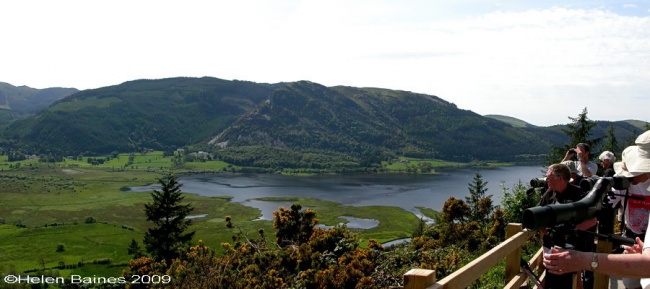
View of southern end of Bassenthwaite Lake from the Upper Viewpoint, May 2009.
Click on image to see a larger version
Overview
Bassenthwaite Lake is a National Nature Reserve, in the Lake District, located in the county of Cumbria in northwest England. It is owned and managed by the Lake District National Park Authority. The area became famous in 2001, when a pair of wild Ospreys nested there, this being the first time in over 150 years that Ospreys had bred in the Lake District. Since then there have been breeding Ospreys every summer and hundreds of people have visited the viewpoints and visitor centre, to see these wonderful birds of prey.
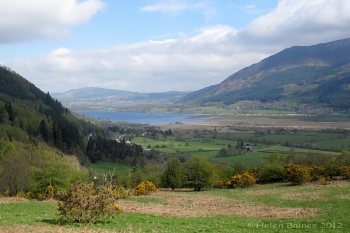
View of Bassenthwaite Lake looking from the lay-by on the B5292 up to Whinlatter Pass, April 2012. The Ospreys built a new nest in 2011, in the flat marshy area on the south side of the lake ~ the area on the middle right of the photo
2018 Ospreywatch News
- The 2018 Ospreywatch season opens on Good Friday, 30th March. Bassenthwaite's No. 14's tracker is still sending back information and shows that he is well on his way north across the Sahara Desert having left the island of Bioko, south of Nigeria a few days ago. Hopefully, KL and her mate Unring, will have a safe journey back from West Africa. Check the LDOP website for updates and their Facebook page
- 31st March: A male Osprey, possibly Unring has been sighted on the nest, busy adding new nesting materials to it.
- 4th April: A female Osprey has arrived and they have been observed mating. Visibility is very poor due to the weather, so the Project Team have not been able to determine if the female is KL.
- 5th April: A 2nd unringed female has appeared at the nest and a fight between the 2 females broke out! Still no sign of KL, who was Unring's partner for 5 years. More details on the LDOP Facebook page, link above.
- 8th April: There is now only one female, first seen on 3rd April.
- 9th April: There was another Osprey visitor to the nest and this one had a blue ring on the left leg, indicating that it was a Scottish bird. The Osprey team were unable to read the letters/numbers on the ring while this bird explored the nest, then flew off heading north. Latest news of No 14 - he has reached Le Toquet, in northern France, ready to cross The Channel.
- 15th April: No 14 has crossed the English Channel near its narrowest point, crossed Kent, the Thames and continued northwest into Leicestershire. When he reached Leicester, he turned and headed southwest to the Cotswolds! At Bassenthwaite there is still no sign of KL and the other affair between Unring and the new female is still more off than on!
- 19th April: Still no sign of KL arriving, but from Unring’s behavior he is still on the lookout for her. He’s been tidying up the nest and spending time on a high branch looking for her to arrive. The OspreyWatch team have said that about 25% of Ospreys returning to UK nests have not turned up this year. The average is 8-10%. The weather has not been very cooperative for northbound migrants! In their first year at Bassenthwaite, they both arrived on 24th April. There has been no mention of the unringed female that was at the nest about 10 days ago, so she may have continued on with her migration.
Birds
Notable Species
Osprey, Eurasian Marsh-Harrier (a pair nested successfully in the reed bed below the viewpoints in 2017), Red Kite (28 April, 2010), Barnacle Goose (These are most probably birds from a resident flock on nearby Derwentwater), Eurasian Oystercatcher, Great Spotted Woodpecker, Tawny Owl, Common Dipper, Common Redstart, European Pied Flycatcher, Eurasian Treecreeper.
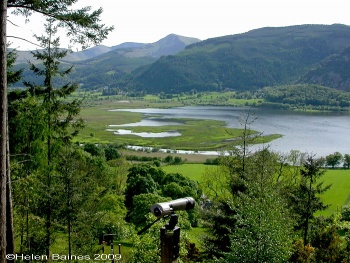
Southern end of Bassenthwaite Lake from the Lower Viewpoint, May 09. In 2011, the Ospreys built a new nest in a marshy area there
Rarities
Red Kite ~ a total of 60 young Red Kites were released in Grizedale Forest, near Windermere, in the summers of 2010, 2011 and 2012. This is the 9th reintroduction and part of the final phase of Red Kite reintroductions in different parts of the UK. It is very likely that these wing-tagged kites will be seen over Bassenthwaite Lake as they explore the Lake District.
Check-list
Birds you can see here include:
Great Crested Grebe, Great Cormorant, Grey Heron, Mute Swan, Greylag Goose, Barnacle Goose, Eurasian Wigeon, Gadwall, Eurasian Teal, Mallard, Northern Pintail, Northern Shoveler, Common Pochard, Tufted Duck, Common Goldeneye, Red-breasted Merganser, Goosander, Osprey, Eurasian Marsh-Harrier, Eurasian Sparrowhawk, Common Buzzard, Common Kestrel, Common Pheasant, Water Rail, Common Moorhen, Common Coot, Eurasian Oystercatcher, Northern Lapwing, Common Snipe, Eurasian Curlew, Common Redshank, Common Sandpiper, Black-headed Gull, Common Gull, Herring Gull, Lesser Black-backed Gull, Common Woodpigeon, Common Cuckoo, Tawny Owl, Common Swift, Great Spotted Woodpecker, Sand Martin, Barn Swallow, Northern House Martin, Meadow Pipit, Pied Wagtail, Eurasian Wren, Dunnock, European Robin, Common Redstart, Eurasian Blackbird, Redwing, Song Thrush, Mistle Thrush, Eurasian Reed Warbler, Common Whitethroat, Blackcap, Wood Warbler, Common Chiffchaff, Willow Warbler, Goldcrest, European Pied Flycatcher, Spotted Flycatcher, Blue Tit, Great Tit, Coal Tit, Long-tailed Tit, Eurasian Nuthatch, Eurasian Treecreeper, Common Starling, Eurasian Jay, Eurasian Magpie, Eurasian Jackdaw, Common Raven, Carrion Crow, Rook, House Sparrow, Chaffinch, Eurasian Siskin, European Greenfinch, European Goldfinch, Eurasian Bullfinch, Lesser Redpoll, Common Crossbill
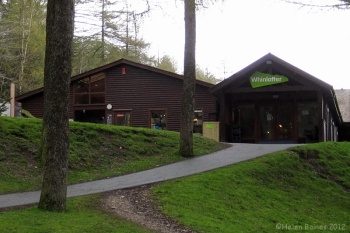
Whinlatter Visitor Centre, located in Whinlatter Forest Park, on the B5292, west of Bassenthwaite Lake, April 2012
Other Wildlife
Red Squirrel, Badger, Roe Deer, Otter, Pipistrelle bat, Weasel, Stoat
Site Information
History and Use
In 2001 it was announced that a pair of Ospreys had nested in the woods above Bassenthwaite Lake. This was the first time in 150 years that a wild pair of the birds had bred in the Lake District. The Forestry Commission and the Lake District National Park Authority had provided a nesting platform in the hope that the Ospreys, they had been seeing during the summer for the last few years, would stay and breed there. Once the eggs were laid, wardens kept a 24 hour watch on the nest to protect the birds from any disturbance, such as illegal egg collecting. The RSPB is also involved in extra support for the Lake District Osprey Project.
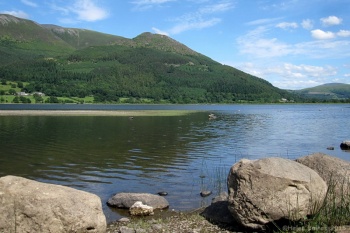
Bassenthwaite Lake, looking across to Dodd Wood and Skiddaw, from Blackstock Point, July 2015
Areas of Interest
- Osprey viewing from Dodd Wood viewpoints
- Whinlatter Visitor Centre in Whinlatter Forest Park, where there is a live video feed from the nest to a big screen. NB: Whinlatter is also a major mountain biking centre.
- Forest walks, provided by the Forestry Commission, starting from the Dodd Wood car park.
- Ivy Crag Wood - a small remnant of oak woodland on the slopes of Dodd below Skiddaw
- Powterhow Wood, with a hide (blind), on the south west edge of Bassenthwaite Lake. Access from the car park at Powter How, via a nice walk through the woods, where you might see Pied and Spotted Flycatchers, Wood Warblers, and Great Spotted Woodpeckers. There's a tunnel under the A66, so no road crossings involved. Or you can park in the A66 layby at Blackstock Point, and take a walk along the lake side to get there. Location shown by arrow on map referenced in External Links, below.[2]
- Dubwath Silver Meadows, a new wetland nature reserve about 17 acres in size, located at the north west end of Bassenthwaite Lake. 1.6 mile circuit of path and boardwalk, plus hides built in Celtic style.[3]
Access and Facilities
- The viewpoints will be open and staffed from early April to the end of August (Late Summer Bank Holiday), 2017. You may still visit the viewpoints outside of the Osprey season, for beautiful views of Bassenthwaite Lake and Derwentwater.
- Osprey watching viewpoints are in Dodd Wood, on the east side of the lake. It is 3 miles north of Keswick off the A591, follow signposts to Dodd Wood from the A66. The car park is opposite the entrance to Mirehouse.
- The Lower Viewpoint - open from 10am to 5pm daily and staffed by volunteers. Excellent views of the Ospreys fishing over the lake. There are feeders out for the local birds, and Red Squirrels sometimes stop by, too.
- The Upper Viewpoint - open from 10.30am to 5pm daily. It is about half a mile, a 30 minutes walk, up a steep incline, to this higher viewpoint. There are telescopes for viewing the nest which is down on the marsh about a mile away.
- There is no charge to use the viewpoint, but there is Pay & Display Parking at the car park by the Old Sawmill Tearoom. Please note that NO CHANGE IS GIVEN.
- There are public toilets at the car park.
- The Old Sawmill Tearoom at Dodd Wood is open through the Osprey season and beyond, closing at the end of October.
- The Whinlatter Visitor Centre is located west of Braithwaite, on the B5292 between Braithwaite and Cockermouth - Grid Ref NY208245. It is open all year, and the Osprey Exhibition will be open from 10am until 5pm during the period that the ospreys are nesting. Parking charges are the same as Dodd Wood.
Contact Details
Whinlatter Visitor Centre phone: 017687 78469
Gallery
Click on images to see a larger version:
Photo by HelenB
Osprey information display at Whinlatter Visitor Centre, April 2012Photo by HelenB
Osprey webcam display, Whinlatter Visitor Centre, April 2012Photo by HelenB
Satellite tracked Osprey chick (no. 11) died in West Africa, but its remains were found. Photo on display at Whinlatter Visitor Centre, April 2012Photo by HelenB
Osprey sculpture at Whinlatter Visitor Centre, April 2012Photo by HelenB
The Old Sawmill Tearoom at Dodd Wood, August 2013Photo by HelenB
Bassenthwaite Lake looking northwest, July 2010Photo by HelenB
Approaching the Upper Osprey Viewpoint, May 2009Photo by HelenB
The 2nd Osprey nest (centre) was only 400m from the Upper Viewpoint. Derwentwater in the background, May 2009Photo by charlierocky
The pair of Ospreys using the second nest for a second year, April 2009Photo by HelenB
The second Osprey nest, May 2009Photo by Mad_BMS
Bassenthwaite Lake, looking towards Skiddaw, May 2005Photo by oncebittern
Male Osprey fishing on Bassenthwaite Lake, June 2010
Content and images originally posted by HelenB
External Links
- Osprey Watch on Facebook for latest updates
- Lake District Osprey Project
- Ivy Crag Wood
- Bassenthwaite Lake on Streetmap
- Location of the Whinlatter Visitor Centre on Streetmap
- Bassenthwaite Lake National Nature Reserve - Hursthole Point map and information (printable pdf)
- Bassenthwaite Lake National Nature Reserve - Ouse Bridge map and information (printable pdf)
- LDOP Flickr album of Osprey and Bassenthwaite photos
- Location of hide near Powterhow Wood
- Dubwath Silver Meadows Wetland Nature Reserve plus Dubwath Silver Meadows map















